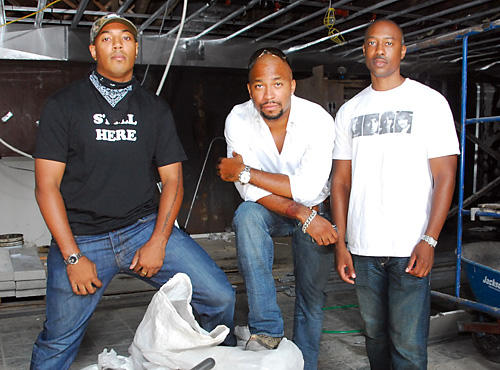The city wants to use its power of eminent domain to push out an almost-finished arts venue in Fort Greene to make way for a Manhattan-based dance troupe and 150 new housing units that comprise the centerpiece of the so-called BAM Cultural District.
“Our goal was to create a live music-and-arts venue,” said Todd Triplett, one of the three friends behind the Amber Art and Music Space, which is being built in a former liquor store at Fulton Street and Ashland Place.
Lured by the promise of the burgeoning “Lincoln Center of Brooklyn” that the city envisions for the area around BAM, Triplett and his partners invested more than $1 million, and spent a year and a half turning the run-down, three-story space into a performance venue, recording studio and an arts non-profit.
That grand idea was shattered on Aug. 21, when Jack Hammer, the director of Brooklyn Planning for the city’s Department of Housing Preservation and Development, informed the three partners that the agency wants to seize the site by eminent domain to make way for the Dancespace Project, a Manhattan-based dance group.
“We were four weeks away from completion, and we get this letter. The city is f—king us,” said Triplett, who has already gotten a liquor license and booked musical acts into 2008. “I’ve never seen anything this egregious. This is in the tradition of Robert Moses.”
The partners claim that no one — including the broker who secured them the space and the landlord, who let them sign a 10-year lease and has collected $200,000 in rent so far — informed them of the city’s plans for the site.
“We refinanced our homes to do this,” said Triplett, standing shell-shocked amid construction materials in the area that would have housed the main lounge. “We took second jobs.”
None of the men, all in their 30s, are newcomers to business or to the neighborhood. Triplett, a Clinton Hill resident, has a Masters in arts administration from the Pratt Institute and runs Parks-Hall, an arts non-profit. McKenzie is a Goldman Sachs alum, a Brooklyn Tech graduate and an Adelphi Street resident. Jenkins’s family runs Paladin Construction, based in the Navy Yard. He also lives on Adelphi Street.
“We [heard the term] BAM Cultural District, [but] it was kind of like how you hear the ‘Theater District,’ ” said Triplett. “We thought BAM was calling it the ‘BAM Cultural District.’ So it kind of fit with what we are going for.”
Local real-estate broker Eva Daniels, who helped the men sign the 10-year lease with building owner Juan Lopez, said she had no idea the site was slated for redevelopment.
“I’m really shocked,” said Daniels. “We asked questions. [Lopez] did tell me about BAM wanting to buy the building, and that he was renting it because they couldn’t agree on a price.”
Lopez did not respond to repeated requests for comment.
The city plan for the “cultural district” calls for BAM to anchor an artistic community that would serve as a counterweight to Lincoln Center. In February, the city requested proposals for a building that would house Dancespace Project, ground-floor retails and 150 units of housing, many of them affordable.
The development would occupy both the Amber site as well as the home of the financial information firm, Track Data Corp, which employs 150 people nearby.
But city officials maintain that adequate public notice of the eminent domain plan was given.
“In 2004, all the affected landowners were informed of the potential of their buildings being taken,” said Seth Donlin, a spokesman for the Department of Housing Preservation and Development. “So [Lopez] … has known about the possibility since 2004.”
The city held a public hearing about the eminent domain process on May 22.
Joe Chan, president of the Downtown Brooklyn Partnership, the quasi-governmental agency overseeing development in the area, said the seizure of the site was necessary to the borough’s growth.
“The mixed-use building will house the city’s first contemporary choreographic center and will provide affordable work and performance space for dance companies and individual artists — many of whom are Brooklyn residents,” Chan said in a statement. “In addition, the new project will create at least 150 units of new housing — half of which will be affordable to low- and moderate-income families.”

























